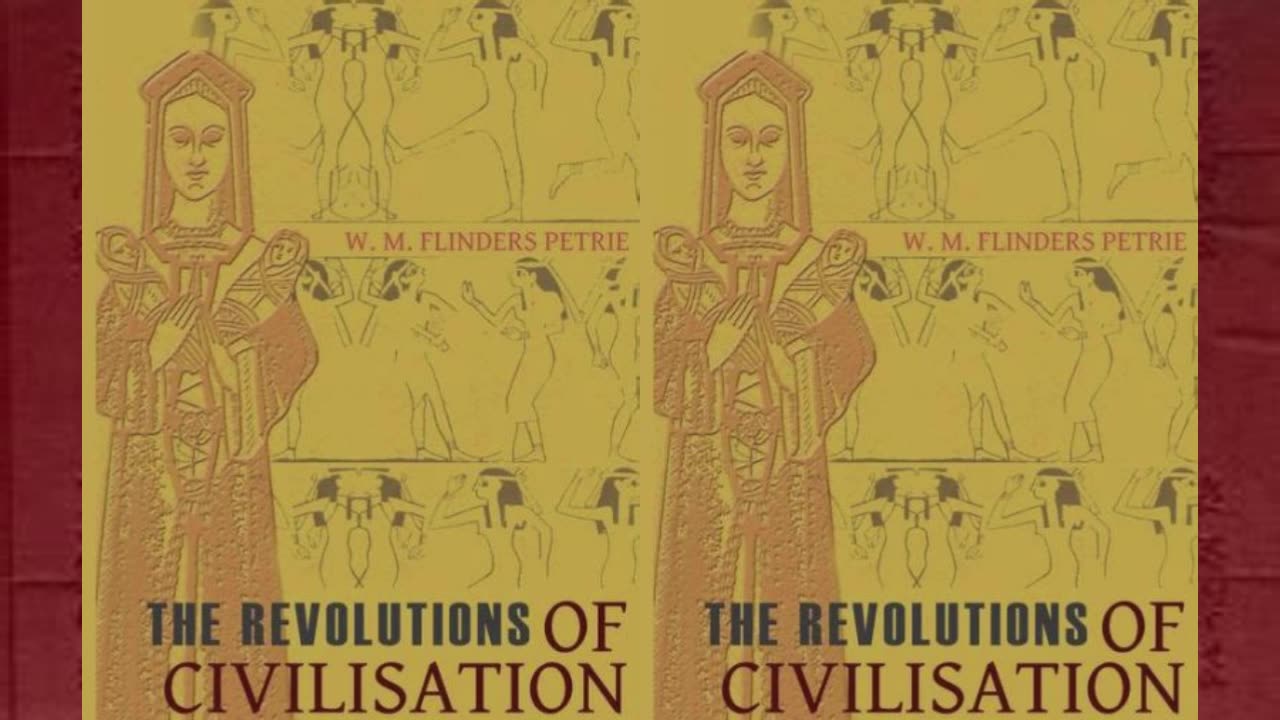Premium Only Content

The Revolutions of Civilization by William Matthew Flinders Petrie (1911)
The Revolutions of Civilization by William Matthew Flinders Petrie, published in 1911, is a provocative and analytical exploration of how civilizations rise, flourish, and ultimately fall - based not on moral decline or chance, but on cycles of innovation, stagnation, and regression. Drawing from his extensive background in archaeology and Egyptology, Petrie presents a theory that civilizations go through repeating phases, driven by human behavior and responses to changing conditions.
Petrie argues that great civilizations emerge through creative revolutions, bursts of originality and progress led by individuals or small groups. However, as their innovations become institutionalized, societies shift from original thought to imitation, and eventually to bureaucracy, decay, and collapse. This decline, he suggests, is often followed by a new wave of creativity elsewhere, continuing the cycle.
Rather than focusing solely on Western history, Petrie compares multiple ancient cultures - including Egyptian, Mesopotamian, Greek, and Eastern civilizations - to support his theory. He emphasizes the role of individual initiative, rather than race or geography, in sparking civilizational growth.
Though written in the early 20th century and framed with the language and assumptions of its time, The Revolutions of Civilization remains an influential early attempt to understand history in terms of recurring patterns rather than linear progress, and it reflects Petrie’s lifelong effort to bring scientific rigor to the study of ancient cultures.
About the Author:
Sir William Matthew Flinders Petrie (1853–1942) was a pioneering British archaeologist and Egyptologist, widely regarded as the father of modern archaeological methodology. Renowned for his meticulous excavation techniques and insistence on recording even the smallest artifact, Petrie transformed archaeology from treasure hunting into a disciplined science. His work laid the foundation for stratigraphy, seriation, and cultural chronology in the field.
Over the course of his career, Petrie excavated more than 50 sites in Egypt and the Near East, including major discoveries at Abydos, Amarna, and Giza. He was instrumental in uncovering the lives of ordinary people, not just royalty, emphasizing the historical value of pottery, tools, and architecture. His work with the Egypt Exploration Fund and later the British School of Archaeology in Egypt greatly expanded Western understanding of ancient Egyptian civilization.
Beyond archaeology, Petrie wrote extensively on civilization, race, and social evolution, including philosophical works like The Revolutions of Civilization. While some of his views reflect the colonial-era biases of his time, his contributions to archaeology remain foundational. He trained and influenced generations of scholars, including Howard Carter, the discoverer of Tutankhamun's tomb.
Flinders Petrie was knighted in 1923 for his services to science, and today he is remembered not only for what he unearthed, but for how he taught the world to dig deeper - literally and intellectually.
Note: while there's no concrete proof that Petrie was initiated into Freemasonry, he was absolutely operating within the intellectual and cultural orbit of men who were - and his work was admired and referenced by them frequently.
-
 6:01:07
6:01:07
Deus Meum Que Jus
19 days agoThe Fourth Turning: An American Prophecy by: William Strauss and Neil Howe
5082 -
 LIVE
LIVE
Barry Cunningham
2 hours agoPRESIDENT TRUMP MADE TODAY A VERY BAD DAY TO BE A DEMOCRAT!
7,454 watching -
 1:45:02
1:45:02
Glenn Greenwald
3 hours agoIsrael Slaughters More Journalists, Hiding War Crimes; Trump's Unconstitutional Flag Burning Ban; Glenn Takes Your Questions | SYSTEM UPDATE #504
68K49 -
 DVR
DVR
Stephen Gardner
50 minutes ago🔥'Burn ALL TRUMP FLAGS’ says Tim Walz + Democrat CAUGHT rigging own election!
2191 -
 10:10
10:10
robbijan
1 day agoHollywood’s Hidden Messages: Predictive Programming & What’s Next
1.13K3 -
 40:13
40:13
MattMorseTV
2 hours ago $3.62 earned🔴It's EVEN WORSE than we thought...🔴
12K37 -
 LIVE
LIVE
The Jimmy Dore Show
3 hours agoSnoop Dogg Is DONE w/ LBGTQ+ Propaganda In Kids Movies! Trump Outlaws Burning the U.S. Flag!
7,066 watching -
 LIVE
LIVE
MissesMaam
4 hours agoDying Light w/ Da Bois💚✨
138 watching -
 LIVE
LIVE
Sgt Wilky Plays
1 hour agoThe Finals with the Pack
47 watching -
 32:55
32:55
Clickbait Wasteland
9 hours ago $0.21 earnedAsking New Yorkers Who They Support For Mayor: Wall Street
3.29K1